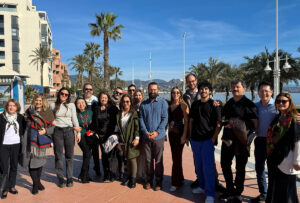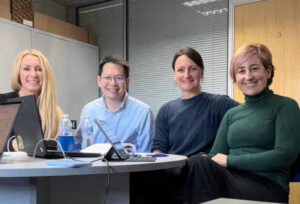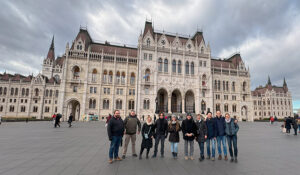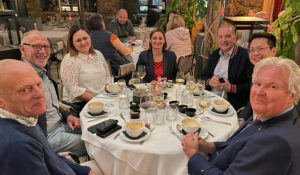When Mark Cole embarked on his PhD in the History of Ideas, he decided to look at the 20th Century. A practicing attorney who in the past has taken two Law degrees and two Theology degrees, Mark devoted all his free time to study. Having recently graduated, he talked to us about his experience.
What led you to your chosen subject for a PhD?
Well, I’ve had an extensive graduate education in other fields but I’d never been able to pursue an interdisciplinary program of study. I have always thought outside the lines of traditional disciplines. In that regard, the History of Ideas was a perfect fit for me. I am interested in philosophy and political theory, art, music and history – all of it. I am always studying, always reading and I like having a directed course of study. I came across the Warnborough program and it just seemed like an obvious fit for my personal interests.
How long were you working on it?
Since several years – I started in 2012 and finished the substance of it last summer. It took a long time to edit and finish up but the heavy lifting was done by summer 2016.
Were you working while you were doing it?
I’m an attorney. I have my normal job – nothing to do with the History of Ideas.
How did you manage to juggle full-time attorney work with the study?
It’s obviously not easy. You have to get up pretty early. I have always had a habit for study and learning and didn’t have time for anything outside of my PhD. I couldn’t read a lot of novels. I just basically used all my time reading around the History of Ideas and eventually to write and edit it.
How did you settle on your focus?
That’s a massive and huge question and it’s the goal of the program. How do you take this limitless concept and bring some focus to it? I’ve always had an interest in the 2oth Century and in particular the disasters, politically. If you look at the world wars and everything around them, it was just not like anything that came before and if you are at all, a thinking human being, you have to ask yourself – how the hell did that happen?
I’ve also always been interested in the cultural expressions of the 20th century and modernism because it is so different from everything that came before. So basically I wanted to understand everything that led up to and became the 20th century. I also had an interest to understand all these fields and so I looked at what I thought to be the most significant contributors to these fields between the centuries.
Then I tried to understand their concepts, their work within the context of the context of the tradition that preceded them and in context of the day. By looking at leading doers, thinkers and makers within their fields, I tried to grasp an understanding of the 20th century within the context of everything that came before.
What challenges were there during the course?
Well, bringing the focus in and getting enough discipline to make some conclusions that are manageable and also to make sure that they are warranted conclusions: also to make it coherent and precise.
Were there any light bulb moments during the course, where something just clicked?
Yes I guess the main thing I came to decide was that the 20th century was radical and unprecedented but when you look at their major contributors, in reality they were also products of what came before. They were entrenched within the traditions and they are not understandable without reference to the traditions that preceded them, but likewise, they cannot be understood outside the context of the radical and destructive nature of the 20thcentury.
When you look at a quintessential figure of modern art – Henri Matisse, you think, well he’s just bold and radical. But when you look deeper and deeper you realise that he is also a product of everything that came before. But that is the power of (his) source and depth.
The Poetry of TS Eliot – yes it was bold and new but at the same time it was deeply entrenched in the traditions. The force of the poetry is that it’s both sides of the coin and without that you’re not appreciating the entire package.
What was it like working with your mentor?
Oh it was great. He was very enthusiastic for the field and very knowledgeable of course. He had his own working theories of how the flow of history actually happens. We talked about that and I would say that I am generally in agreement with him. That was very helpful . He has a special love for Dante, and Dante is of course present, even in the 20th century and no matter where you look.
It was fun because he had a dimmer view of the 20th century and was not as enthusiastic for the philosophy or the music or the arts as I was . I felt like we had a lot of good exchanges where I felt like I sort of convinced him that this stuff is also traditional.
Do you have any future aims to use your PhD?
I wouldn’t mind doing some lecturing. It is a credential that can help to open up some doors. I wouldn’t mind using this opportunity to share these ideas with other people. I’m not done with the discipline of the history of ideas. I’d like to think I am just beginning with it and if opportunities come along, even better.
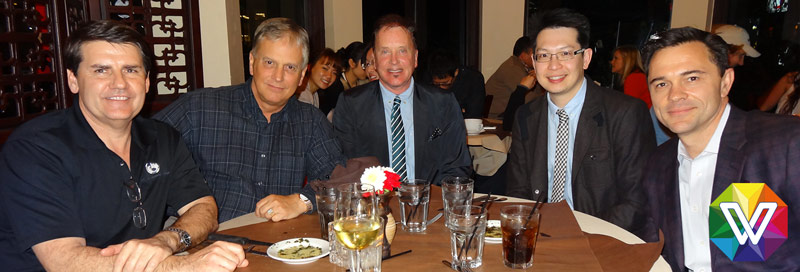
For further information on the degree program that Mark took, and for links to our related courses, click on the links below:

